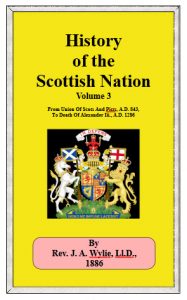The middle of the ninth century saw the Scots and Picts united under the scepter of Kenneth, the son of Alpin. The advent of this union was long deferred: it was at least consummated in A.D. 843; but even then it received no enthusiastic welcome from those to whom, as might have been foreseen, it brought great increase of power and prestige. The idea of mixing their blood to form one nation, and uniting their arms to establish one central throne, and so taking pledges for the maintenance of peace at home, and the acquisition of influence abroad, however meritorious it seems to us, does not appear to have approved itself to the two races that inhabited the one country of Caledonia. They entertained this idea only when it came to be forced upon them by the stern lessons of the battlefield—a school in which it would seem the education of infant nations must begin.
This union was preceded and prepared by a series of great battles. The question at issue in these fierce conflicts was, to which of the two nationalities, the Scots or the Picts, shall the supremacy belong, and by consequence the right to govern the kingdom? The wars waged to determine this point ended in a supreme trial of strength on the banks of the Tay near Scone.1
The engagement was a desperate one. Seven times the Picts assailed, and seven times were they driven back. Their king, Bred, fell in battle, and his armour, afterwards presented to Kenneth MacAlpin, was sent by him to hung up at Icolmkil.2
From that bloody field the Scots and Picts emerged one nation. Supremacy, which had been the object aimed at by the combatants till now, was abandoned for the more practical and wiser policy of union. Battle had swept away one of the two thrones which had hitherto borne sway in Caledonia, and the one throne left standing was that of the prince whose progenitor, Aidan, Columba had made to sit on the Lia-Fail, or Stone of Destiny, and anointed as the first really independent sovereign of the Scots.
